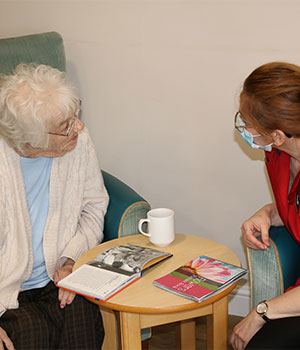If you have an ageing loved one, choosing the right type of care is important to ensure the health and happiness of everyone involved. But with so many terms surrounding later life care, it can be difficult and confusing to sift through all your options. Learn more about respite care and when it might be ideal for your situation.
“Respite care” means taking a break from your regular responsibilities as a carer whilst someone else looks after your loved one. This can range from finding a volunteer to sit with the person whilst you run errands for a few hours to spending a month or two in a care home so you can deal with personal matters.
There are several respite care options, depending on the reason and duration you need it. Here’s a closer look at each one.
A temporary stay in a care home can range from less than a week to a few months. During a respite care stay, your loved one will experience all aspects of life that long-term residents do. They’ll receive all the help and support they need, from getting dressed to using the toilet to taking a bath.

Staff will also get to know your loved one’s interests so they can participate in activities they enjoy, such as drawing, painting, gardening, pet therapy and even day trips to somewhere in the community. If the person you care for enjoys their stay, it might make sense to make it a permanent arrangement.
The purpose of adult daycare is to give isolated seniors a chance to socialise, make friends and participate in activities. Carers can also use this time to work, run errands or do chores. Transportation to the centre is often provided, but there may be a charge.
If you care for an older adult and need more time for yourself, you can arrange to have a paid carer visit your home. You can set this up temporarily—such as one week straight so you can go on holiday—or regularly—such as every Saturday so you can get some much-needed downtime on the weekend. If the person you care for needs 24-hour supervision, you can arrange live-in care.

Some charities and other organisations offer adult sitting services. This is when a trained volunteer keeps the person company for a few hours at a time. Whilst often arranged for safety reasons, even simply having someone to talk to can make a big difference to your senior loved one.
Even if you are the primary carer, you can still ask friends and family to lend a hand. These helpers can take the place of volunteer sitters or paid home care providers by watching your loved one for part of the day or even temporarily moving in with them. When everyone takes turns providing care, it prevents any one person from becoming overwhelmed.

Everyone involved in a care situation benefits from respite care. As a carer, you might feel guilty handing off the responsibility to someone else, but it’s important to take time for yourself, too. It can even be beneficial for the person receiving care. Here are some reasons why you might consider respite care for your loved one and the benefits it provides:

If you or a loved one needs respite care, Country Court Care is here to help. We offer short-term stays in our comfortable, person-centred residential care and nursing homes. Our motto is “Our family, caring for yours,” which we exhibit daily during our residents’ respite care stays. For more information about the services available from Country Court Care, please contact us at 01733 571 951 today.